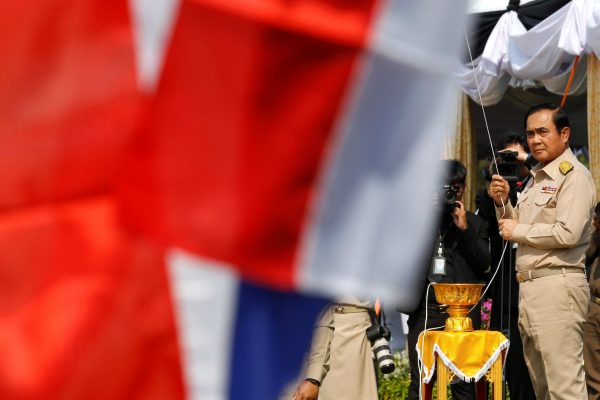The middle class also demands access to political resources, while underscoring the importance of participatory democracy. But in Thailand the orthodox concept of the middle class as an agent of democratic change seems to be under challenge.
Since the Thai political crisis of 2005, which culminated a year later in the military coup that overthrew the elected government of Thaksin Shinawatra, it has become apparent that the Thai middle class and the country’s many civil society organisations are no longer agents of change, but instead have become guardians of the ancien régime.
In 2005, the Bangkok-based middle class, under a new movement called the People’s Alliance for Democracy (PAD), took to the streets to topple Thaksin, largely considered a champion of the poor, on the grounds that he abused power for his own benefit.
On the surface, the middle class and civil society claimed to be guarding democracy, which had supposedly been tainted by Thaksin. At a deeper level, however, it was the fear that Thaksin and his assertive populist policies would empower marginalised rural citizens that explained why the middle class and civil society rejected his kind of democracy.
The protesters also accused Thaksin of disrespecting the much-revered monarchy — an inviolable institution in Thailand and long regarded as a symbol of prosperity for the Thai middle class. The monarchy provided itself as an instrument for its supporters to disparage democracy, à la Thaksin, through a binary choice: moral verses immoral politics, with the monarch representing the former and selfish politicians the latter.
Chakrit Tiebtianrat argues that Thaksin was the first prime minister who sought to deal with civil society systematically. He set out to co-opt those who could be co-opted, and to discredit those who could not, either by dividing them from their supporters, or through more devious means such as using legal manoeuvers to diminish the effectiveness of civil society.
But by selectively choosing to support certain civil society organisations, Thaksin also helped promote a culture of corruption and nepotism. Critics interpreted this as Thaksin’s devious way of buying allegiances and loyalty from his constituencies. Those civil society organisations that continued to cooperate with the Thaksin government were perceived by critics as politically superfluous.
Meanwhile, those who challenged the integrity of Thaksin’s government were viewed with skepticism and possibly harassed. A divide-and-rule tactic characterised the relationship between his government and civil society in general. But civil society groups finally gained an upper hand over the government by joining PAD. The ultimate goal was to rid Thaksin of political power.
PAD conveniently created a situation that enabled political intervention by the military. And in September 2006, the army staged a coup against the Thaksin government. In 2014, as prime minister Yingluck Shinawatra began to consolidate her power on the strength of populist programs inherited from her brother, the middle class and civil society organisations — now under a new name, the People’s Democratic Reform Committee (PDRC) — returned to street politics, reviving the old trick of assigning themselves the role of moral guardian against the supposed evil of Yingluck. Her premiership, like that of her brother, ended in a military coup in May 2014.
The rise and fall of democracy in modern Thailand, as demonstrated in two successive coups, can be described, on the one hand, as a situation in which the middle class and civil society could no longer tolerate corrupt regimes and therefore gave their support to the coups. On the other hand, a deeper analysis is needed to comprehend the complexity of Thai politics beyond a struggle between the ‘moral’ middle class and civil society and ‘immoral’ politicians.
It is true that the ‘network monarchy’, which includes key institutions such as the monarchy, bureaucracy and military, had long governed Thai politics, and the middle class and civil society became enthusiastic supporters of the network monarchy, exploiting the revered status of the royal institution to reap benefits from the system. Gradually, the alliance between the network monarchy and members of the middle class and civil society began to isolate the rural population.
While the network monarchy was able to redefine the political landscape by placing the monarchy at the top of the political structure, the rural population was allowed to participate in electoral politics on certain conditions — their chosen governments must be subservient to the dominant network monarchy, otherwise they would be overthrown in coups. This kind of structure permitted members of the network monarchy and supporters among the middle class to defend their political territory, while at the same time appearing to adhere to democratic processes.
Thaksin constructed his political network by highlighting the fact that the electoral process could be used to overturn the power equilibrium and dismantle the status quo. He concentrated on winning votes from the two regions of the country long marginalised by the network monarchy — the north and northeast. Thaksin could count on those votes owing to his generous populist programs. His political party, Thai Rak Thai, won landslide elections twice, causing grave concerns among the network monarchy and the middle class, which retaliated through extra-parliamentary means.
The network monarchy, drawing on the powerful moral authority of King Bhumibol, might have dominated the political realm in this way for several decades, but Bhumibol recently passed away, paving the way for his unpopular son, Vajiralongkorn, to be enthroned. The new king is undoubtedly generating concerns among the middle class and civil society groups because without Bhumibol their political interests are no longer guaranteed in the transition period. This anxiety has driven Thailand’s middle class to further divorce itself from trust in the democratic apparatus and its supposed role as an agent of democratic change.
At this critical royal transition, both the middle class and civil society do not even hide their taste for authoritarianism. It manifests itself chiefly in politicisation and self-interest on their part.
Pavin Chachavalpongpun is Associate Professor at Kyoto University’s Center for Southeast Asian Studies.
This article was first published here on Global Asia.

